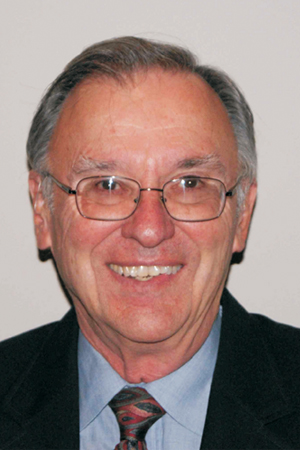Marcian (Ted) Hoff

Hoff was born in Rochester, New York. His degrees include a Bachelor of Electrical Engineering from Rensselaer Polytechnic Institute (1958) and an M.S. (1959) and a Ph.D. (1962), both in Electrical Engineering, from Stanford University. In the 1959-1960 time frame, he and his professor, Bernard Widrow, co-developed the LMS adaptive algorithm which is used in many modern communication systems, e.g. adaptive equalizers and noise-cancelling systems.
In 1968, he joined Intel Corporation as Manager of Applications Research and in 1969 proposed the architecture for the first monolithic microprocessor or computer central processor on a single chip, the Intel 4004, which was announced in 1971. He contributed to several other microprocessor designs, and then in 1975 started a group at Intel to develop products for telecommunications. His group produced the first commercially- available monolithic telephone CODEC, the first commercially-available switched-capacitor filter and one of the earliest digital signal processing chips, the Intel 2920. He became the first Intel Fellow when the position was created in 1980.
In 1983, he joined Atari as Vice President of Corporate Research and Development. In 1984, he left Atari to become an independent consultant. In 1986, he joined Teklicon, a company specializing in assistance to attorneys dealing with intellectual property litigation, as Chief Technologist, where he remained until he retired in 2007.
He has been recognized with numerous awards, primarily for his microprocessor contributions. Those awards include the Kyoto Prize, the Stuart Ballantine Medal and Certificate of Merit from the Franklin Institute, induction into the National Inventors Hall of Fame and the Silicon Valley Engineering Hall of Fame, the George R. Stivitz Computer Pioneer Award, the Semiconductor Industry 50th Anniversary Award, the Eduard Rhein Foundation Technology Award, the Ron Brown Innovation Award, the Davies Medal and induction into their Hall of Fame from Rensselaer Polytechnic Institute and the National Medal of Technology and Innovation.
He has been recognized with several IEEE awards including the Cledo Brunetti Award (1980), the Centennial Medal (1984), and the James Clerk Maxwell Award (2011). He was made a Fellow of the IEEE in 1982 “for the conception and development of the microprocessor” and is now a Life Fellow. He is a named inventor or co-inventor on 17 United States patents and author or co-author of more than 40 technical papers and articles.
Hoff is an alumnus of the 1954 Science Talent Search.